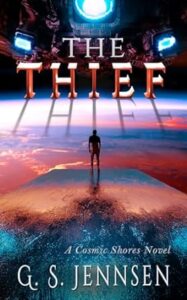
For the fourth consecutive year, I am leading a judging team in the Self-Published Science Fiction Competition (SPSFC4), and my team has been given 32 books to whittle down to two semifinalists. To start, we’ve split them up so that each team member has nine or ten books to evaluate, and together we’ll pick the top 15-25% to pass to our team members for further reading. At this stage, I DNF books more often than I finish them, so I tend not to have more than two or three full reviews. But after having put Exin Ex Machina at the top of my list in the first round of SPSFC2, I was excited to have another G.S. Jennsen novel in my allocation this year, and I was pretty sure The Thief would be one of those books I finished.
The Thief follows an intelligence officer in a multi-species, interstellar society still bearing scars from a war against a seemingly unbeatable rival. On a hunch, he tails a suspicious figure coming from the direction of a high-security building, only to find himself on the other side of the galaxy amidst an alien people he’d known nothing about—a people doing everything they can to survive a series of devastating attacks from an invisible and implacable enemy.
The Thief is listed as part of a long-running series, but it’s a functional standalone in the sprawling Amaranthe universe of connected stories—think something akin to the Cosmere, albeit sci-fi. The lead has a sufficiently action-packed backstory that I’d be surprised if he hadn’t been a key character in other books within the series, but this one is very much its own adventure. It’s not making much attempt to tie into an overarching epic plot, it’s aiming to be an easily digestible, one-off space opera.
And as an easily digestible, entertaining, one-off space opera, it’s largely successful. The lead’s willingness to go haring off to the other side of the galaxy on a gut feeling briefly broke immersion before the realization that resurrection technology significantly changes the risk/benefit calculus. But after that, the story was pretty smooth sailing. It’s not a tale that takes a lot of narrative risks, instead falling into a general rhythm of “see a problem, solve a problem, see another problem,” but the pacing is smooth and each individual problem introduces enough tension to keep the reader wanting to know what happens next.
The one aspect that didn’t quite click for me was the romantic subplot. While the characters involved were physically attracted to each other, there wasn’t enough chemistry to make the reader particularly invested in the relationship. If it had just been a brief interlude to the main plot, it probably wouldn’t have bothered me much, but while it was certainly never more than a subplot, it gets enough page time to detract a bit from the overall story.
Even if I didn’t love the romantic subplot, I still found that everything wrapped up in a satisfying way. The plot was organized so neatly that I didn’t necessarily find myself on the edge of my seat, but every subplot that had me curious got addressed, leading to a comfortably self-contained story that allows the reader to explore the rest of the world–or not–at their own leisure. It’s not daring, but it’s entertaining and accessible. Sometimes, that’s all you need.
Recommended if you like: short, easily digestible space opera.
Can I use it for Bingo? It’s hard mode for Self-Published, Dreams, and Space Opera and also features Multiple POVs.
Overall rating: 12 of Tar Vol’s 20. Three stars on Goodreads.
SPSFC score: 6/10 for my personal score. Advancement will be determined in concert with my teammates.
